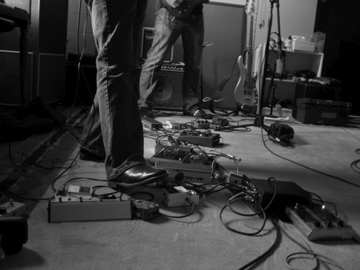Still waiting on that call back from Emily Eavis? Missed out on that festival slot you’d set your sights on? Maybe it’s time to take it into your own hands.
At least, that was the approach of Sound Consultancy artist . From the humble beginnings of a residency in a local pub, Paul has expanded beyond his band into running , a 4 day festival in his hometown of Tunbridge Wells. Now in its 7th year, the festival saw 20,000 fans attend in 2012. Now we’re not necessarily saying that Dave from your band should attempt to run a large scale music festival (and if Davestock 2013 turns out to be the biggest festival ever, then I apologise for my cynicism) but there is still plenty to be learnt from Paul’s approach.
At Sound Consultancy, we receive dozens of emails a day asking if we can manage bands, produce their records, promote their tours and find them gigs. In almost every case, the answer is “yes, we can.” We’ve found our approach to has successfully taken many acts to the next level. But all too often, those artists contacting us have missed out a crucial question: what can they do for themselves?
It might seem strange for a company that provides these services to encourage acts to ‘do it themselves.’ But place yourself for a moment in the plush office of the director of that record company whose attention you crave. How certain can you be that your band would bring in a return? They are going to want to know that you’re worth investing in. If you can demonstrate that you can build a fanbase, bring in the audience and sell the records on your own, you’re going to be a much more attractive prospect. So what should an independent musician do to prove their worth?
1. Book It Yourself
Sounds obvious, but it’s all too easy for musicians to sit back and expect the gigs to come rolling in. Be proactive. Contact venues. Contact promoters. You don’t have to have a manager to send out emails and make phone calls.
2. Run It Yourself
If you’re not content with the opportunities in your hometown, start events yourself. Who knows, with a bit of hard work it could become a cornerstone of the musical calendar.
3. Network Yourself
Communication is key. From links with industry professionals and creative artists that benefit you both, like putting on a gig at an art exhibition. Don’t feel you have to limit yourself to musical partners either; we’ve seen our artists forge links with jewellers, breweries and campervan manufacturers. Get creative!
4. Sell It Yourself
In the digital age, there’s nothing to stop bands making their music available for purchase. When sites like can get your music on iTunes in a few days, there’s no excuse to wait for HMV to order your album in bulk!
It’s this hard-working, DIY approach that has netted Paul and his band 20,000 album sales. Now working with our Promotions team at Sound Consultancy, they have a tremendous platform to build on even further. This is the vision of Sound Consultancy: to help artists grow, develop and take their music to the next level. Our development packages are aimed at helping our clients become the very best they can be. The bottom line, though, is this – the more an act does for itself, the more we can do for them.
So artists: push yourselves! Find out just how much you can do for yourselves – then you’ll be able to see just how much the industry can do for you.
Ian Griffiths is a partner at Sound Consultancy, a UK-based company aimed at taking developing artists to the next level. Thanks to Paul Dunton Ensemble for their involvement in this blog.
sound consultancy, music industry, music business, music advice, unsigned bands, unsigned artists, music career







